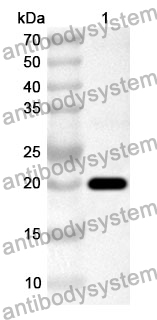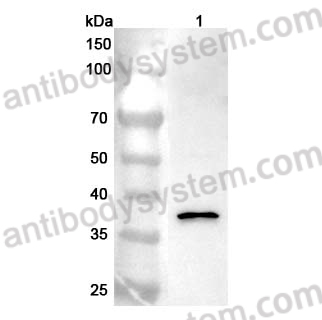Catalog No.
PHG09801
Species reactivity
Human, Mouse, Rat
Host species
Rabbit
Isotype
IgG
Clonality
Polyclonal
Immunogen
E. coli - derived recombinant Human RAD51 (Val174-Asp339).
Tested applications
ELISA: 1:4000-1:8000, IHC: 1:50-1:100, WB: 1:1000-1:4000
Target
HsRAD51,RAD51A,RECA,hRAD51,RAD51,RAD51 homolog A,DNA repair protein RAD51 homolog 1
Purification
Purified by antigen affinity column.
Accession
Q06609
Applications
ELISA, IHC, WB
Form
Liquid
Storage buffer
0.01M PBS, pH 7.4, 50% Glycerol, 0.05% Proclin 300.
Stability and Storage
Use a manual defrost freezer and avoid repeated freeze thaw cycles. Store at 2 to 8°C for frequent use. Store at -20 to -80°C for twelve months from the date of receipt.
Mass cytometric detection of homologous recombination proficiency in circulating tumor cells to predict chemoresistance of metastatic breast cancer patients., PMID:40456663
The influence of homologous recombination repair on temozolomide chemosensitivity in gliomas., PMID:40120126
Homologous recombination repair status in metastatic prostate cancer by next-generation sequencing and functional immunofluorescence., PMID:39914385
Next-generation cell-penetrating antibodies for tumor targeting and RAD51 inhibition., PMID:39352803
Atrial fibrillation recurrence after catheter ablation is associated with RAD51 and p63 proteins., PMID:38988509
KIN17 functions in DNA damage repair and chemosensitivity by modulating RAD51 in hepatocellular carcinoma., PMID:38935235
Meiotic protein SYCP2 confers resistance to DNA-damaging agents through R-loop-mediated DNA repair., PMID:38383600
Photonic Crystal Surface Mode Real-Time Imaging of RAD51 DNA Repair Protein Interaction with the ssDNA Substrate., PMID:38248420
Studying the DNA damage response pathway in hematopoietic canine cancer cell lines, a necessary step for finding targets to generate new therapies to treat cancer in dogs., PMID:37655260
Identification of RAD51 foci in cancer-associated circulating cells of patients with high-grade serous ovarian cancer: association with treatment outcomes., PMID:37541687
Inhibition of p53 and ATRX increases telomeric recombination in primary fibroblasts., PMID:37499040
Three-color dSTORM Imaging and Analysis of Recombination Foci in Mouse Spread Meiotic Nuclei., PMID:37497444
Association of location of BRCA1 and BRCA2 mutations with benefit from olaparib and bevacizumab maintenance in high-grade ovarian cancer: phase III PAOLA-1/ENGOT-ov25 trial subgroup exploratory analysis., PMID:36564284
Alternative academic approaches for testing homologous recombination deficiency in ovarian cancer in the MITO16A/MaNGO-OV2 trial., PMID:36156447
Dynamics of DNA damage response markers, RAD51 and XRCC1, throughout the menstrual cycle and pregnancy in healthy women. Increment during pregnancy and relation to a low titer of antinuclear antibodies., PMID:35816185
Multiplexed-Based Assessment of DNA Damage Response to Chemotherapies Using Cell Imaging Cytometry., PMID:35628514
The RNA-binding protein La/SSB associates with radiation-induced DNA double-strand breaks in lung cancer cell lines., PMID:34636174
Gefitinib Combined with Cetuximab for the Treatment of Lung Adenocarcinoma Harboring the EGFR-Intergenic Region (SEC61G) Fusion and EGFR Amplification., PMID:34342091
Reproductive Isolation Between Taxonomically Controversial Forms of the Gray Voles (Microtus, Rodentia; Arvicolinae): Cytological Mechanisms and Taxonomical Implications., PMID:34040633
In search for biomarkers and potential drug targets for uterine serous endometrial cancer., PMID:33754208
Kinase CDK2 in Mammalian Meiotic Prophase I: Screening for Hetero- and Homomorphic Sex Chromosomes., PMID:33671248
Impact of hypoxia on the double-strand break repair after photon and carbon ion irradiation of radioresistant HNSCC cells., PMID:33288855
Predictive biomarkers for sacituzumab govitecan efficacy in Trop-2-expressing triple-negative breast cancer., PMID:33196706
Detection of DSBs in C. elegans Meiosis., PMID:32840787
Precision medicine phase II study evaluating the efficacy of a double immunotherapy by durvalumab and tremelimumab combined with olaparib in patients with solid cancers and carriers of homologous recombination repair genes mutation in response or stable after olaparib treatment., PMID:32778095
Prognostic value of tumor-infiltrating lymphocytes (TILs) and their association with PD-L1 expression and DNA repair protein RAD51 in patients with resected non-small cell lung carcinoma., PMID:32653671
CDK5 Activates Hippo Signaling to Confer Resistance to Radiation Therapy Via Upregulating TAZ in Lung Cancer., PMID:32407930
[Hereditary breast carcinomas pathologist's perspective]., PMID:32241645
Abnormal expression of p-ATM/CHK2 in nasal extranodal NK/T cell lymphoma, nasal type, is correlated with poor prognosis., PMID:32220941
A novel BCMA PBD-ADC with ATM/ATR/WEE1 inhibitors or bortezomib induce synergistic lethality in multiple myeloma., PMID:32060401
Chemotherapy combined with bevacizumab for the treatment of advanced lung adenocarcinoma cancer harboring EGFR-ANXA2, EGFR-RAD51, ATR and BRCA2 mutations: A case report., PMID:31865638
A Novel Cell-Penetrating Antibody Fragment Inhibits the DNA Repair Protein RAD51., PMID:31375703
Biallelic germline BRCA1 mutations in a patient with early onset breast cancer, mild Fanconi anemia-like phenotype, and no chromosome fragility., PMID:31347298
Synthetic lethality of a cell-penetrating anti-RAD51 antibody in PTEN-deficient melanoma and glioma cells., PMID:30863489
Analysis of S100A11 in DNA Damage Repair., PMID:30710290
FKBP25 participates in DNA double-strand break repair., PMID:30620620
ATR-Mediated Global Fork Slowing and Reversal Assist Fork Traverse and Prevent Chromosomal Breakage at DNA Interstrand Cross-Links., PMID:30184498
A cell-penetrating antibody inhibits human RAD51 via direct binding., PMID:29036688
Silver nanoparticles coupled to anti‑EGFR antibodies sensitize nasopharyngeal carcinoma cells to irradiation., PMID:28990103
Meiotic Recombination in the Giraffe (G. reticulata)., PMID:28723680
Genetic and Small Molecule Disruption of the AID/RAD51 Axis Similarly Protects Nonobese Diabetic Mice from Type 1 Diabetes through Expansion of Regulatory B Lymphocytes., PMID:28461573
Chromatin organization revealed by nanostructure of irradiation induced γH2AX, 53BP1 and Rad51 foci., PMID:28094292
Phase II clinical study of valproic acid plus cisplatin and cetuximab in recurrent and/or metastatic squamous cell carcinoma of Head and Neck-V-CHANCE trial., PMID:27884140
Accession of Tumor Heterogeneity by Multiplex Transcriptome Profiling of Single Circulating Tumor Cells., PMID:27630154
MAR-Mediated transgene integration into permissive chromatin and increased expression by recombination pathway engineering., PMID:27575535
Ovarian Cancers Harbor Defects in Nonhomologous End Joining Resulting in Resistance to Rucaparib., PMID:27702817
Mapping Recombination Initiation Sites Using Chromatin Immunoprecipitation., PMID:27511175
Cell Killing Mechanisms and Impact on Gene Expression by Gemcitabine and 212Pb-Trastuzumab Treatment in a Disseminated i.p. Tumor Model., PMID:27467592
RING domain-deficient BRCA1 promotes PARP inhibitor and platinum resistance., PMID:27454289
Mechanisms of Cell Killing Response from Low Linear Energy Transfer (LET) Radiation Originating from (177)Lu Radioimmunotherapy Targeting Disseminated Intraperitoneal Tumor Xenografts., PMID:27196891


